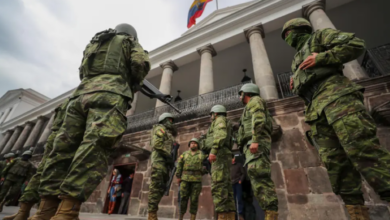Spain: Pedro Sánchez and the independence crisis
Listen this article
On Sunday, February 10, thousands of Spaniards went out to the streets to demand that the president call elections. What is happening?

Around 45,000 people, sympathizers of different political parties such as the PP (Popular Party), C's (Citizens) and Vox, went to the streets of Madrid to demand "immediate and hard-line elections with those who want to break Spain with the Catalan independence movement", as stated by La Voz de Galicia.
Leer en español: España: Pedro Sánchez y la crisis independentista
The traditional parties of the right-wing demand that Pedro Sánchez, president of Spain, break relations with any type of independence forces.
Sánchez had a series of dialogues with the independence parties and struggles of Catalonia, in which two spaces were proposed, the first being institutional (Bilateral State-Generalitat Commission) and the second a dialogue table. This tried that within the conformation of the table of parties a representation in Catalonia existed, "two by party, but specifying that they must have the capacity of decision in the two territorial scopes (state and Catalan)", according to ABC Spain.
However, the Spanish government decided to stop the dialogues by stating that the Generalitat is to blame since they did not accept the proposed framework. It should be noted that one of the main problems between Spain and Catalonia is the interest of the second in carrying out independence movements. From the beginning, Sanchez excluded the possibility of a referendum of self-determination within the framework of the dialogues.
Este Gobierno no aceptará nunca un referéndum de autodeterminación.
Trabajamos por tender todos los puentes posibles desde la política. Esta es la propuesta del Gobierno de España para Cataluña: convivencia, dialogo y ley. Constitución https://t.co/1iXBt7oqEB— Pedro Sánchez (@sanchezcastejon) 8 de febrero de 2019
In spite of the above, the Spanish government indicated that the possibility of resuming the dialogues is possible as long as the negotiators belonging to the Generalitat accept the framework of what is proposed.
Maybe you're interested in reading: Ireland: in the eye of the storm because of the Brexit
More fuel to the fire
With the march, last Sunday, not only the Spanish right puts in check the Sanchez socialist government, but the "pause" in the dialogues, comes at a key moment for the Spanish president, since on Wednesday, February 13, they will take carried out the votes of the General Budgets of the State. In these votes, the budget of Spain is approved, and there, the Catalan support is essential for the government of Sánchez.
If the necessary support is not obtained, the Spanish vice-president, Carmen Calvo, already affirmed that "they will continue to govern by a decree of law to comply with their agenda", according to 20 minutes. In addition, at the end of the meeting of the Council of Minister and according to the same media argued that "this government has done with laws and royal decrees negotiated and validated with all the political groups of the Chamber". This Government has come to stay. fraud to topple a government and call elections".
Without a necessary vote, the Spanish government will not back down or yield to pressures to call early elections, it will simply re-evaluate how it can carry out political proposals, since in the words of Calvo, "the time of the legislature is shortened".
Sanchez's response
Faced with the above, Pedro Sanchez said that his government works for Spanish unity which means "unite the Spanish and not face them, as did the right in the marches." He also said that the crisis is a product of the government led by the government of Mariano Rajoy (belonging to the PP), "what I do as president of the government is to solve a state crisis that the Popular Party aggravated when it was in power," it is affirmed by La Jornada.
Thus, Sánchez tries to balance between the opposition of the right-wing, which opposes the current government with every situation that involves the pro-independence movement; and a left that reminds him that thanks to them Sanchez could reach power, after unseating Mariano Rajoy. An unfavorable situation, that added to the marches of last Sunday, will not let Sanchez leave unharmed.
LatinAmerican Post | Laura Viviana Guevara Muñoz
Translated from "España: Pedro Sánchez y la crisis independentista"





